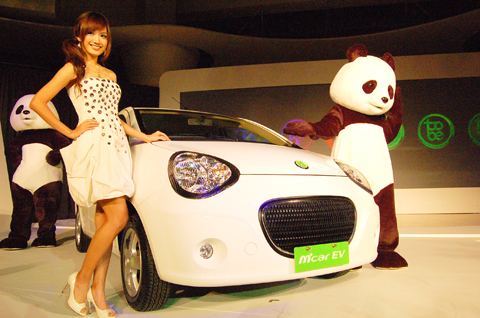Following the launch of its first own auto brand “Luxgen” (納智捷) in September, Yulon Motor Co (裕隆汽車) yesterday unveiled a second brand — “Tobe” (酷比) — that will target the domestic and export markets.
The nation’s biggest automaker plans to start exporting Tobe cars to Vietnam next month, which will be followed shortly by sales to the Philippines, China and the Middle East, Hsu Kuo-hsing (許國興), president of Yulon Tobe Motor Co (裕隆酷比汽車), told reporters on the sidelines of the launch.
Yulon Tobe was founded with a capital of NT$200 million (US$6.1 million) and is 100 percent owned by Yulon Motor.

PHOTO: KAO CHIA-HO, TAIPEI TIMES
Hsu refused to reveal export figures, saying the company was waiting for market feedback after Tobe’s launch.
Tobe cars are a revamped model based on the Panda car of Chinese automaker Geely Automobile Holdings Ltd (吉利汽車), a technology partner of Yulon.
Hsu said more than 35 percent of the car parts — including the engine, car seats, gears and windshield — were designed or enhanced in Taiwan to cater to local demand and regulations, and the cars have passed stringent safety tests, allaying some buyers’ concern that they could be purchasing a “made in China” car.
Yulon Tobe and Geely are going to work more closely on exporting Tobe cars, either using the Tobe or Geely brand when marketing them in different markets in the future, Hsu said.
“Major automakers around the world have set up bases in China, and a lot of car components are produced there. It is the trend,” Yulon Tobe chairman Chen Kuo-rong (陳國榮) said.
He said Tobe was the first product of the company’s cooperation with China in terms of technology transfer, adding that Yulon’s strength in electric cars could be applied to Tobe cars.
Taiwanese consumers would see the first Tobe 1,300cc M’ Car (pronounced my-car) hit the road in January, with a price tag of about NT$400,000.
“This is the price range wherein we see no competition at all,” said Chen, adding that university students and young adults would be drawn to its affordability.
The company expects to sell up to 500 M’ Cars per month in Taiwan next year. It also hopes to launch an electric-version when the market for electric cars becomes more mature and gains subsidies from the government, Yulon Tobe said.
Thanks to the commodity tax cut of NT$30,000 imposed by the government to boost car sales this year, Taiwan’s new vehicle sales jumped 49.1 percent year-on-year to 25,829 units last month, statistics from the Ministry of Transportation and Communications showed.
Cumulative sales in the first 10 months of the year rose 9.4 percent to more than 218,000 units, the ministry said.
The tax cut expires on Dec. 31.
“Discontinuing the tax cut next year would impact the industry, and every carmaker has to compete on the same ground,” Yulon Tobe’s marketing executive Steven Lo (羅明德) said.

Sweeping policy changes under US Secretary of Health and Human Services Robert F. Kennedy Jr are having a chilling effect on vaccine makers as anti-vaccine rhetoric has turned into concrete changes in inoculation schedules and recommendations, investors and executives said. The administration of US President Donald Trump has in the past year upended vaccine recommendations, with the country last month ending its longstanding guidance that all children receive inoculations against flu, hepatitis A and other diseases. The unprecedented changes have led to diminished vaccine usage, hurt the investment case for some biotechs, and created a drag that would likely dent revenues and

Global semiconductor stocks advanced yesterday, as comments by Nvidia Corp chief executive officer Jensen Huang (黃仁勳) at Davos, Switzerland, helped reinforce investor enthusiasm for artificial intelligence (AI). Samsung Electronics Co gained as much as 5 percent to an all-time high, helping drive South Korea’s benchmark KOSPI above 5,000 for the first time. That came after the Philadelphia Semiconductor Index rose more than 3 percent to a fresh record on Wednesday, with a boost from Nvidia. The gains came amid broad risk-on trade after US President Donald Trump withdrew his threat of tariffs on some European nations over backing for Greenland. Huang further

CULPRITS: Factors that affected the slip included falling global crude oil prices, wait-and-see consumer attitudes due to US tariffs and a different Lunar New Year holiday schedule Taiwan’s retail sales ended a nine-year growth streak last year, slipping 0.2 percent from a year earlier as uncertainty over US tariff policies affected demand for durable goods, data released on Friday by the Ministry of Economic Affairs showed. Last year’s retail sales totaled NT$4.84 trillion (US$153.27 billion), down about NT$9.5 billion, or 0.2 percent, from 2024. Despite the decline, the figure was still the second-highest annual sales total on record. Ministry statistics department deputy head Chen Yu-fang (陳玉芳) said sales of cars, motorcycles and related products, which accounted for 17.4 percent of total retail rales last year, fell NT$68.1 billion, or

HSBC Bank Taiwan Ltd (匯豐台灣商銀) and the Taiwan High Prosecutors Office recently signed a memorandum of understanding (MOU) to enhance cooperation on the suspicious transaction analysis mechanism. This landmark agreement makes HSBC the first foreign bank in Taiwan to establish such a partnership with the High Prosecutors Office, underscoring its commitment to active anti-fraud initiatives, financial inclusion, and the “Treating Customers Fairly” principle. Through this deep public-private collaboration, both parties aim to co-create a secure financial ecosystem via early warning detection and precise fraud prevention technologies. At the signing ceremony, HSBC Taiwan CEO and head of banking Adam Chen (陳志堅)